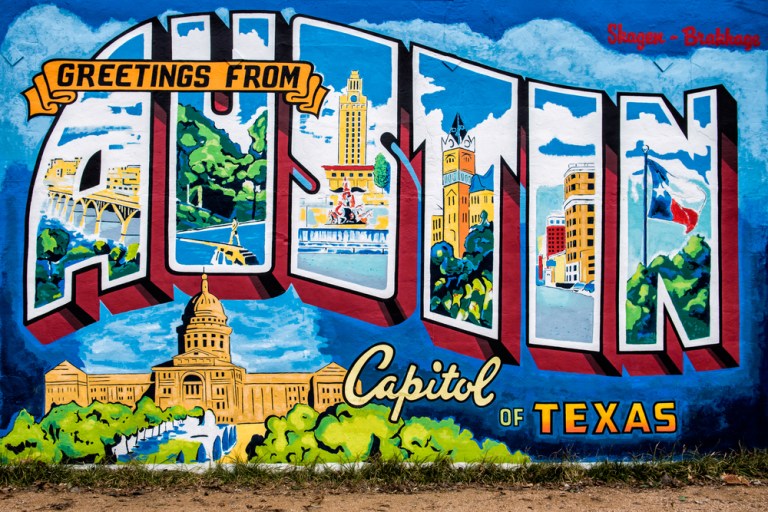Austin Is Bringing The FinTech Heat

You know what they say — everything is bigger in Texas.
That couldn’t ring truer for the state’s capital, which many consider to have a tech scene bursting with potential and growth. Though Austin may fall in the shadows of bigger U.S. tech hubs, like Silicon Valley and New York City, the city has been recognized as having a fast-growing tech sector with strong expansion.
In this week’s edition of PYMNTS’ Weekly Tech Center Roundup, we take our first look at a U.S. tech hub that may seem like an underdog but is gaining ground in the “next Silicon Valley” race. Nate Stewart, Group Product Manager for BigCommerce, an eCommerce platform with deep roots in Austin, provided a glimpse into what really helps Austin stand apart and why startups can’t help but flock to the city.
Before we jump into the post, here are a few quick facts about Austin and its tech scene:
- Austin has an estimated population of approximately 931,830 people.
- The city’s GDP is $112.4 billion.
- In recent years, Austin has had an increase in data-focused startups and businesses.
- Last year, 147 companies in Austin’s digital tech ecosystem raised more than $966 million in new capital, with more than $3.9 billion in exits.
- Tech jobs account for 11 percent of total Austin employment. By 2020, its predicted the number of jobs in the tech sector will rise to 120,257.
- Austin is home to 4,182 tech companies.
- ECommerce led the Austin startup scene, with 20 deals topping $165 million in 2015.
Austin’s startup community has seen a big transformation over the years.
Back in 2009, when eCommerce platform BigCommerce was getting its start, Austin wasn’t considered a place where working for a startup was common. But as Stewart pointed out, today, startups comprise a sizable percentage of the city’s community.
“As the tech community has grown, access to mentorship, talent and funding has grown as well, making it much easier to start and scale a startup,” he explained. “There’s a positive feedback loop here that’s causing more and more startups to be created in or move to Austin.”
Though BigCommerce was actually founded in Sydney, Australia, Stewart said the company has had an office in Austin since May 2009 and now considers the city to be its headquarters. The company’s founders saw there was a big opportunity to bring the BigCommerce platform to U.S. small businesses and wanted to establish roots in a city that provided access to a wealth of talent and was also backed by a strong technology industry.
Stewart said Austin fit the bill.
In Austin, the cost of living is relatively affordable, and taxes are low, especially compared with other major tech hubs, while also offering resources to budding entrepreneurs and tech industry talent. Not only was the city recognized as having the fastest-growing tech scene in the U.S. last year, but it is also considered to be the best place in the U.S. to start a small business.
According to American City Business Journals, the growth in the number of SMBs based in Austin increased from 2010 to 2013 by 9.7 percent. This was coupled with huge growth in Austin’s economic activity and the city’s reputation for being young, vibrant and entrepreneurially minded.
Austin also has the advantage of attracting and keeping a talented pool of applicants by way of it being home to several nationally recognized colleges. Stewart explained that having a tech community that’s typically more accessible and close-knit than in much larger tech hubs has provided Austin’s startup and entrepreneur landscape with a more welcoming, supportive vibe.
“Many people that move to Austin from other major tech cities remark that the environment feels less competitive and that entrepreneurs regularly help each other when possible, which I think is somewhat unique to Austin,” he added.
Another unique aspect to Austin’s tech ecosystem is the South by Southwest conference and festivals that are held every March. The event is not only a big revenue generator for the city’s economy, but it has also helped to raise the profile of local startups, while also giving Austin the opportunity to shine as it draws in hundreds of thousands of visitors each year.
The increasing spotlight on Austin has contributed the city growing quite quickly over the last few years. It’s estimated that 157 people move to Austin every day, which makes it no surprise the city is referred to as a top startup mecca.
“While not yet a large city, the strength of Austin’s economy, large student population and penchant for encouraging a diversity of thought have all made it an attractive city for creatives and entrepreneurs,” Stewart explained. “For BigCommerce, Austin has been a wonderful city to grow. We’ve gone from a handful of local employees to more than 250 spread across two Austin offices.”
Picking Austin as the right city to expand its U.S. business back in 2009 helped BigCommerce to continue a theme of growth for the retail merchants it enables to shift online and compete in an ever-changing digital landscape.
“Our mission is to help merchants sell more,” Stewart said. “We continue to focus on helping merchants differentiate and grow their businesses by building beautiful online stores, reducing checkout conversion and reaching customers wherever they are shopping.”